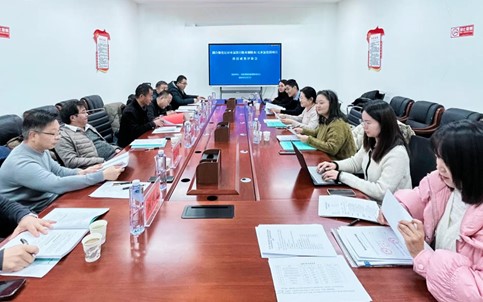On December 17, 2024, the scientific and technological achievement evaluation meeting for the project "Coupling Catalytic Reaction for the Dehydration of Hydromagnesite to Produce Low-Water/Anhydrous Magnesium Chloride" undertaken by Professor Feng Juntang from Academician Duan Xue's team at the State Key Laboratory of Chemical Resource Utilization was held in Xining. Seven industry experts, including Director Zhao Yilian from the Qinghai Provincial Science and Technology Achievement Transformation Center, and project team members attended the meeting.
At the meeting, the evaluation expert group listened to the project team's report on the "Coupling Catalytic Reaction for the Dehydration of Hydromagnesite to Produce Low-Water/Anhydrous Magnesium Chloride" project and reviewed the relevant evaluation materials. After inquiry, discussion, and comprehensive review, the evaluation committee experts agreed that the project's research results are innovative and have independent intellectual property rights. They unanimously agreed that the "Coupling Catalytic Reaction for the Dehydration of Hydromagnesite to Produce Low-Water/Anhydrous Magnesium Chloride" project passed the scientific and technological achievement evaluation, recognizing that the research level of the project has reached an internationally advanced level.
The "Coupling Catalytic Reaction for the Dehydration of Hydromagnesite to Produce Low-Water/Anhydrous Magnesium Chloride" project is a collaboration between the State Key Laboratory of Chemical Resource Utilization at Beijing University of Chemical Technology and Qinghai Salt Lake Industry Co., Ltd. The project addressed the key challenges of high energy consumption in the dehydration of hydromagnesite and the difficulty in balancing dehydration precision and structure. Based on theoretical calculations, the project optimized reaction conditions and explored the reaction mechanisms, forming a new method for the low-temperature dehydration preparation of low-water magnesium chloride through coupled reactions. The project completed studies on the performance of a tubular furnace coupled dehydration experimental device, the performance of a fixed-bed reactor coupled dehydration, and the exploration of the kinetics of hydromagnesite coupled dehydration reactions, revealing the structural evolution of magnesium chloride coupled dehydration, and achieved significant results without the introduction of hydrogen chloride gas. The project's research results have been published in one SCI paper and one invention patent has been applied for.
The project's scientific and technological achievements have been fully affirmed by the experts through the achievement evaluation. This is not only a full affirmation of the project's results but also a strong incentive for the project team's long-term adherence to scientific research innovation and unremitting efforts. Next, the team will take this opportunity to maintain the forward-looking and practical nature of the research, further deepen research and cooperation, promote the progress of pilot applications, and strive to achieve the industrial application of the technology as soon as possible, contributing greater strength to the development of the magnesium chloride industry.

